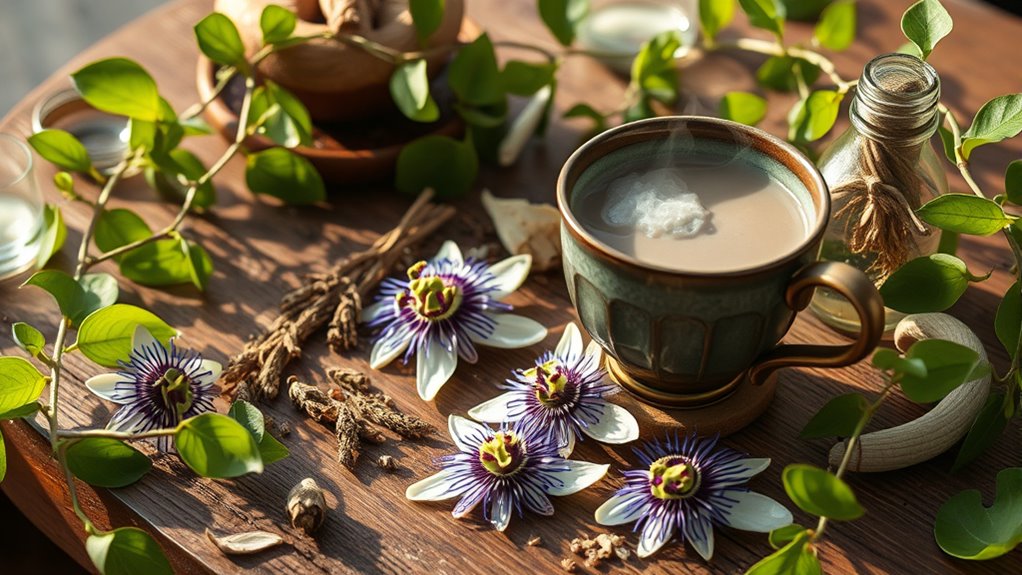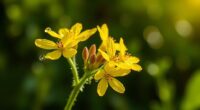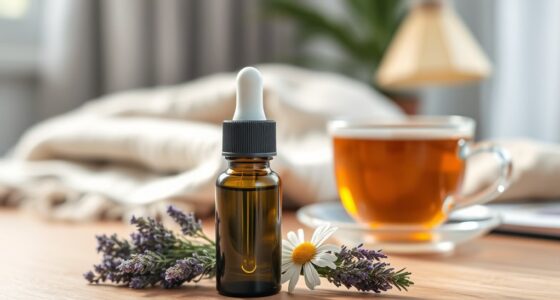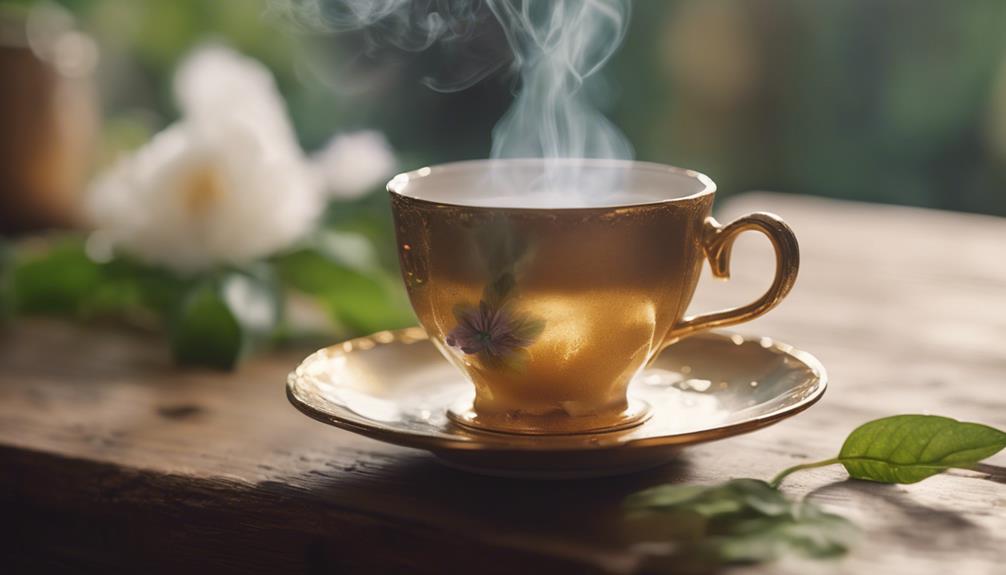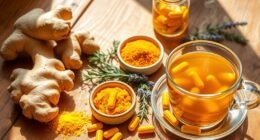Herbal stress relief options like kava and passionflower are trending as natural ways to ease anxiety and promote relaxation. Kava, used traditionally in the Pacific Islands, contains kavalactones that calm the nervous system. Passionflower, long used in teas, offers gentle sedative effects from flavonoids and alkaloids. While these herbs have proven benefits, safe use is key, as risks like liver toxicity have emerged. Continuing to explore these herbal options can reveal how they fit into your stress management routine.
Key Takeaways
- Growing interest in herbs like kava and passionflower reflects a shift toward natural stress relief options.
- Kava’s active kavalactones promote relaxation by impacting the brain’s limbic system, traditionally used in Pacific Island cultures.
- Passionflower has sedative properties from flavonoids and alkaloids, historically used to treat anxiety and insomnia.
- Safety considerations include moderation due to rare liver toxicity with kava and potential allergic reactions from passionflower.
- Scientific research supports traditional uses, emphasizing responsible herb use through proper dosing and healthcare consultation.

Have you noticed how more people are turning to herbs to manage stress? It’s a trend rooted in a mix of tradition and curiosity about natural remedies. When you explore herbs like kava and passionflower, you discover that their popularity isn’t accidental. Instead, it’s based on centuries of traditional uses that have demonstrated their calming effects. But before you dive in, it’s vital to consider herbal safety, as not all herbs are suitable for everyone, and some can have side effects or interact with medications.
Kava, also known as Piper methysticum, has long been used in Pacific Island cultures for its relaxing properties. Traditionally, it’s prepared as a drink during social and spiritual gatherings, fostering calmness and social bonding. Its active compounds, kavalactones, work on the brain’s limbic system, helping to reduce anxiety and promote relaxation. While traditional uses highlight its calming benefits, modern use has prompted questions about herbal safety. High doses or prolonged use of kava have been linked to rare cases of liver toxicity, prompting many health professionals to recommend moderation and consultation with a healthcare provider before use. Despite these concerns, many find that when used responsibly, kava offers a natural way to ease stress without the grogginess often associated with pharmaceuticals.
Kava offers calming benefits but should be used responsibly due to potential liver risks.
Passionflower, or Passiflora incarnata, is another herb with a rich history of traditional uses. Native Americans and Europeans alike have used it for centuries to treat anxiety, insomnia, and nervous tension. Traditionally, passionflower was brewed into teas or used as a tincture to calm the mind and promote restful sleep. Its active constituents, including flavonoids and alkaloids, contribute to its sedative effects. When you consider using passionflower, it’s worth noting that its safety profile is generally favorable, but some individuals might experience allergic reactions or mild side effects. As with many herbs, the key is understanding the traditional uses and applying them responsibly. Passionflower’s gentle approach to easing stress makes it popular among those seeking an alternative to synthetic medications.
Additionally, recent studies have shed light on the mechanisms of herbal compounds, providing scientific support for their traditional uses and helping to inform safe application. In both cases, the traditional uses of these herbs provide a valuable foundation for understanding their benefits and risks. Many cultures have relied on them for centuries, which supports their reputation as natural stress relievers. However, herbal safety remains a priority — it’s vital to research, follow dosing instructions, and consult healthcare professionals if you’re pregnant, nursing, or on other medications. As you explore these herbal options, keep in mind that their roots in tradition offer clues about their potential, but responsible use ensures they remain a safe choice. By respecting traditional uses and understanding safety considerations, you can incorporate these herbs into your stress management routine confidently.
Frequently Asked Questions
Are Herbal Remedies Safe for Long-Term Use?
You might wonder if herbal remedies are safe for long-term use. While many herbs boast traditional use and herbal longevity, safety varies depending on the plant and your health. It’s crucial to consult with a healthcare professional before regular use, especially for chronic conditions. Relying on traditional use as a guide, you can incorporate herbs responsibly, but always stay aware of potential interactions and long-term effects to guarantee safe, effective relief.
Can Herbal Stress Relief Affect Prescription Medications?
You might think herbal stress relief is harmless, but beware—herbal interactions can interfere with prescription medications. While you seek natural calm, some herbs could alter drug effectiveness or cause unexpected side effects. It’s essential to verify prescription compatibility before adding herbal remedies. Don’t assume all herbs are safe; consulting your healthcare provider ensures your stress relief doesn’t turn into a complicated mix-up.
What Are the Best Dosages for Herbal Stress Supplements?
You should focus on the herbal potency and maintain dosage consistency when considering the best dosages for herbal stress supplements. Start with the recommended amounts on the label and adjust based on your response, always consulting a healthcare provider. Since herbal potency varies, it is crucial to follow standardized dosages to ensure safety and effectiveness. Remember, consistent dosing helps you monitor effects and avoid potential side effects.
Do Herbal Remedies Have Any Known Side Effects?
Herbal remedies can have side effects, especially if you don’t pay attention to herbal interactions and dosage safety. You might experience allergic reactions, digestive issues, or drowsiness. It’s vital to follow recommended dosages and consult a healthcare professional before combining herbs with medications. Being aware of potential interactions helps prevent adverse effects and guarantees you use herbal remedies safely and effectively.
How Quickly Do Herbal Stress Relief Products Work?
You might wonder how quickly herbal stress relief products work. Herbal efficacy varies depending on the herb and individual, but some people notice effects within a few days to a week. Following dosage guidelines is essential to guarantee safety and effectiveness. Consistency is key, so take the product as directed and give your body time to respond. Keep in mind that natural remedies often take longer than pharmaceutical options.
Conclusion
As you explore these herbal stress relief options, remember that individual responses vary. For example, Sarah, a busy professional, found that incorporating passionflower tea into her nightly routine markedly reduced her anxiety. Always consult with a healthcare provider before starting new herbal remedies. By staying informed and attentive to your body’s signals, you can find a natural, effective way to manage stress and enhance your well-being.

